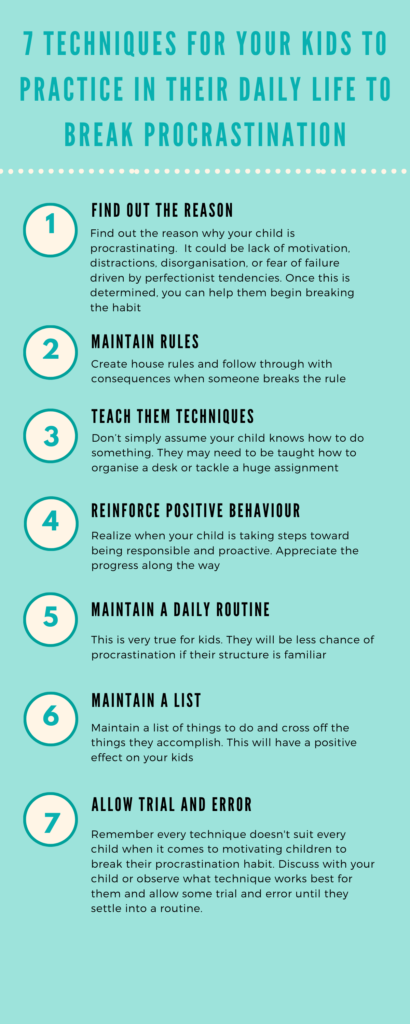Staying motivated all the time is impossible. Procrastination sets in very quickly and with everything, our kids have on their plates, after school, sporting events, dance practices, etc., it’s challenging to feel motivated and prepared when it’s time to settle down and get things done.
Before we start to explore how to bust these procrastinators in our children, let’s understand what is procrastination and what are the various types of procrastinations and its repercussions of on our kids.
What does Procrastination mean?
Procrastination is the habit of delaying difficult tasks in favour of doing things that are easier or more fun. And it seems procrastination and children go together like peas and carrots.
The Consequences of Procrastination
Procrastination may relieve pressure in the moment, but it can have steep emotional, physical, and practical costs. Students who routinely procrastinate tend to get lower grades, workers who procrastinate produce lower-quality work, and in general, habitual procrastinators can experience reduced well-being in the form of insomnia or immune system and gastrointestinal disturbance. Procrastination can also jeopardize both personal and professional relationships.
Source: (psychologytoday.com)
Types of Procrastination
Some researchers classify procrastination in two main types: passive and active procrastinators.
Passive procrastinators Delay the task because they have trouble making decisions and acting on them Active procrastinators: Delay the task purposefully because working under pressure allows them to “feel challenged and motivated” Others define the types of procrastinators based on different behavioral styles of procrastination, including:
Source: (verywellmind.com)
How To overcome Procrastination
Here are some practical techniques you can add to your child’s routine to overcome procrastination and jump-start their success.
1. Make a calendar

Make a list of all of the assignments, reports, projects etc. and when they will be due, in your child’s student planner or on a family calendar. Make sure to note any significant events or other family commitments, and note when these dates overlap each other.
Once your child gets a better understanding of their routine, schedule time on free-days to do homework or studying. This will help your child in avoiding too much to manage on any given night.
2. Break down tasks in smaller portions

It can be difficult for students to begin a large project. Try approaching it by breaking down the assignment into several smaller steps. Put the steps in chronological order and estimate how long each part will take.
Add these steps to their planner or calendar. Following these smaller steps will remove the stress of trying to finish the entire project the day before its submission.
3. Sort tasks by completion time

Your child probably knows which items will take the shortest amount of time and which will take them much longer. List them out by completion time or get the easiest ones done first and then move on to the difficult ones. You could also encourage your child to do an assignment they like first.
4. Schedule breaks

Working non-stop can strain your child. Let them walk away from their desk for a few minutes to clear their head. Something as simple as grabbing a snack can help them come back to their homework feeling refreshed.
Try scheduling a short, 5-minute break after every 30 minutes of work.
7 techniques for your kids to practice in their daily life to break the procrastination
Procrastination Downloadable PDF

Every single effort you invest in breaking the procrastination habit will positively impact all areas of your and child’s life — now and in the future!
Let me know in the comments, which are the five procrastination lies/excuses you hear the most?






